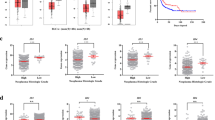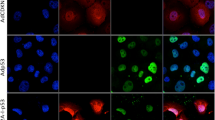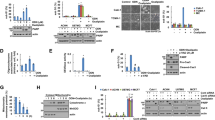Abstract
To investigate the effects of the expression of Bcl-2 protein in bladder cancer on the apoptosis induced by cisplatin or adenoviral-mediated p53 gene (Ad5CMV-p53) transfer, we transfected the bcl-2 gene into KoTCC-1, a human bladder cancer cell line that does not express the Bcl-2 protein. The Bcl-2-transfected KoTCC-1 (KoTCC-1/B) exhibited significantly higher resistance to both cisplatin and Ad5CMV-p53 transfer than did either the parental KoTCC-1 (KoTCC-1/P) or the vector-only transfected cell line (KoTCC-1/C). The flow cytometric analysis of the propidium iodide-stained nuclei and DNA fragmentation analysis after cisplatin or Ad5CMV-p53 treatment revealed DNA degradation in both KoTCC-1/P and KoTCC-1/C, whereas KoTCC1/B showed a marked inhibition of DNA degradation. Following the treatment with cisplatin or Ad5CMV-p53, the accumulation of p53 protein was highly detectable for a long period in KoTCC-1/B compared to that in KoTTC-1/P and KoTCC-1/C. Furthermore, the cisplatin and Ad5CMV-p53 treatments each reduced the volume of the subcutaneous tumors established in nude mice formed by KoTCC-1/P or KoTCC-1/C; in contrast, their reductive effects on the tumors formed by KoTCC-1/B were significantly suppressed. The intraperitoneal tumor cell implantation model revealed that the prognoses of mice injected with KoTCC-1/B were significantly inferior to those of the mice injected with either KoTCC-1/P or KoTCC-1/C after treatment with cisplatin or Ad5CMV-p53. These findings suggest that the expression of Bcl-2 in bladder cancer cells interferes with the therapeutic effects of cisplatin and Ad5CMV-p53 through the inhibition of the apoptotic pathway.
This is a preview of subscription content, access via your institution
Access options
Subscribe to this journal
Receive 50 print issues and online access
$259.00 per year
only $5.18 per issue
Buy this article
- Purchase on Springer Link
- Instant access to full article PDF
Prices may be subject to local taxes which are calculated during checkout
Similar content being viewed by others
Author information
Authors and Affiliations
Rights and permissions
About this article
Cite this article
Miyake, H., Hanada, N., Nakamura, H. et al. Overexpression of Bcl-2 in bladder cancer cells inhibits apoptosis induced by cisplatin and adenoviral-mediated p53 gene transfer. Oncogene 16, 933–943 (1998). https://doi.org/10.1038/sj.onc.1201602
Received:
Revised:
Accepted:
Published:
Issue Date:
DOI: https://doi.org/10.1038/sj.onc.1201602
Keywords
This article is cited by
-
Study of anticancer effects of platinum levetiracetam and levetiracetam via cancer biomarkers genes expression on HepG2 cell line
Molecular Biology Reports (2023)
-
Phosphorylation of paxillin confers cisplatin resistance in non-small cell lung cancer via activating ERK-mediated Bcl-2 expression
Oncogene (2014)
-
In vitro antioxidant and anticancer effects of solvent fractions from prunella vulgaris var. lilacina
BMC Complementary and Alternative Medicine (2013)
-
A predicted protein, KIAA0247, is a cell cycle modulator in colorectal cancer cells under 5-FU treatment
Journal of Translational Medicine (2011)
-
Increased expression of p27 is associated with the cisplatin resistance in gastric cancer cell line YCC-3
Archives of Pharmacal Research (2010)



